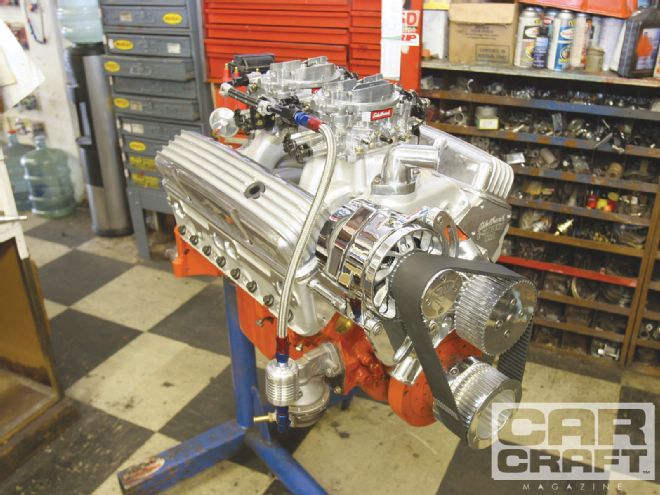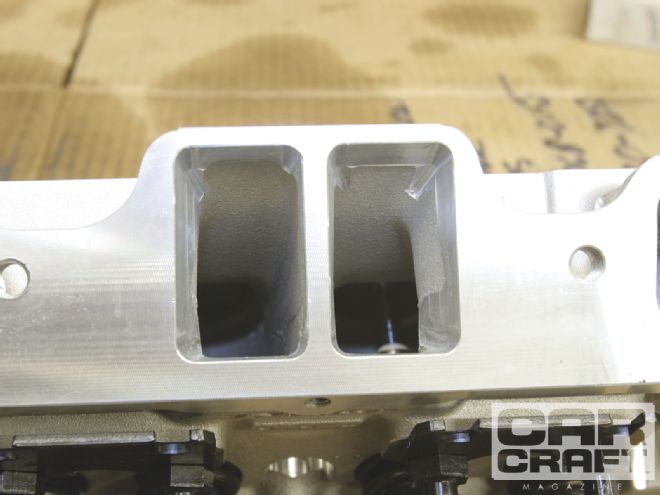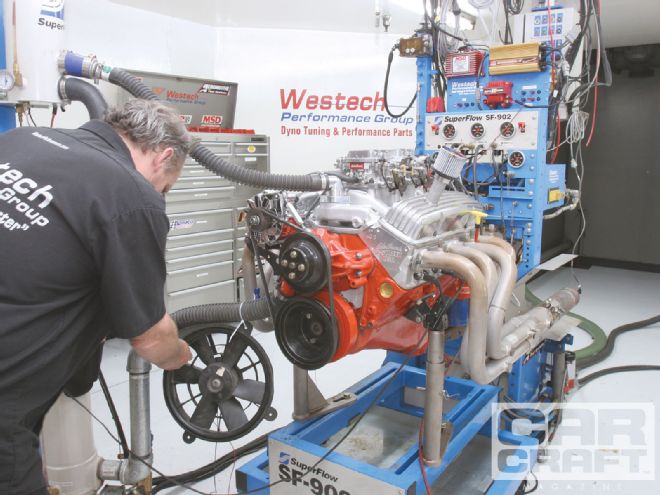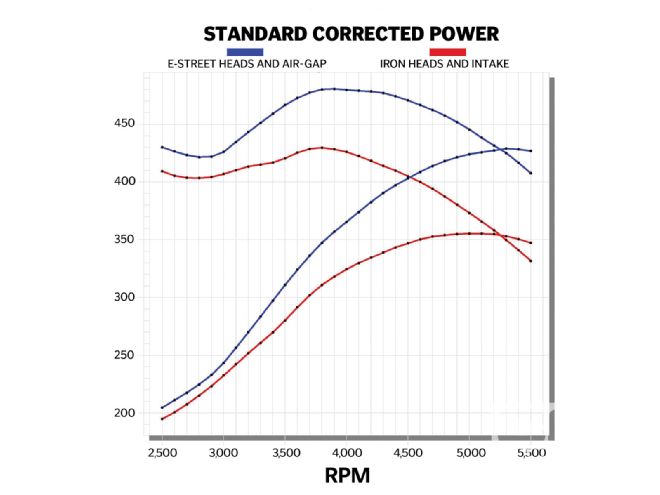
In the Aug. '09 issue, Ted Toki and the guys at Westside Performance stuffed a 4.00-inch crank into a 350 small block Chevy as an alternative to the same old 383 build. While the primary point of the exercise was to see if the small block Chevy could be built inexpensively and easily, we couldn't resist scrounging up some long-block parts for a test. Using a set of 882 iron heads that had been modified with a set of 2.02 intake valves, the small block Chevy engine made a respectable 355hp peak at about 5,000 rpm and a big, fat table of torque right off idle to about 4,500 rpm, with a peak of 429 lb-ft at 3,700. We could have been satisfied with the iron combo, but we wanted to test Edelbrock's newest low-cost aluminum head called the E-Street. For $949.95 per pair, the E heads fit right into the budget of this street stroker. While we were at it, we spiced up the whole deal with a dual-carb intake so we can sit and stare at it when we're not out burning rubber.
Small Block Chevy Build: Step One
Edelbrock Dual-Quad Air-Gap Manifold
381 hp at 5,100
442 lb-ft at 3,800
The glory hounds wanted to go directly to a single-plane and a 750 carb, but we decided to give up a little top end power for the fairground appeal of the RPM Dual-Quad Air-Gap. The primary differences between the Air-Gap and the standard Edelbrock C-26 manifold are the 1 5/8 inches of additional height and the space between the runners and the valley pan. That height could cause hood clearance issues, but this engine is destined for a straight-axle Gasser '55 Chevy, so it isn't going to be a problem. Edelbrock also warns that your stock HEI won't work on the taller manifold. The reality is that it does; we just had to get the timing perfect when we stabbed the distributor because there is little room for adjustment. Another option is to face the vacuum advance away from the carbs. This works on the dyno, but we can't guarantee it won't hit the firewall in the car. Another distinction between the two is the lack of an oil-fill tube boss, so if you want the 283/327 look, use the C-26. And neither the Air-Gap nor the C-26 has a provision for the stock alternator bracket, so you'll have to use an aftermarket setup. Edelbrock sells the intake alone or as a kit that includes two 500-cfm Thunder Series AVS carburetors, carb linkage, a manifold gasket, and a fuel line.
We ran the carburetors out of the box with the recommended linkage arrangement that opens the primaries on the front and rear carb simultaneously then opens both sets of secondaries when you hit wide open throttle. We were pleasantly surprised with the fuel curve even though we were running 1,000 cfm worth of carbs. At full-throttle, the air/fuel ratio was around 11.5:1 below 3,400 rpm then cleaned up to 12.5 at horsepower peak. We decided to leave the carbs alone on the dyno even though leaning them out in the midrange would likely score us some torque. Instead, we were curious to see how they would run in the car in out-of-the-box condition, so we'll save that tuning for another story. The duals come with an electric choke on the primary (rear) carb and a manual choke on the front, even though a nice full-throttle pump shot in the morning usually does the trick without using the chokes at all. With 37 degrees of total timing in the MSD Street Fire, the manifold and carb swap picked up 26 hp and 13 lb-ft for a peak of the 381 hp and 442 lb-ft. The peak rpm remained the same; the engine just picked up a lot more power through the entire curve.
Step Two
Edelbrock E-Street Heads
429 hp at 5,300
481 lb-ft at 3,900
 For the sake of comparison, we looked at the numbers from a set of factory GM iron Vortec heads flowed previously on the same flow bench. The E-Streets were within 2 to 3 cfm through midlift then flowed 12 to 14 cfm more through the intake after 0.500 lift and 10 to 12 cfm more through the exhaust after 0.400 lift. The E-Streets have 185cc intake and 60cc exhaust ports.
For the sake of comparison, we looked at the numbers from a set of factory GM iron Vortec heads flowed previously on the same flow bench. The E-Streets were within 2 to 3 cfm through midlift then flowed 12 to 14 cfm more through the intake after 0.500 lift and 10 to 12 cfm more through the exhaust after 0.400 lift. The E-Streets have 185cc intake and 60cc exhaust ports.
The E-Street heads are made in the USA to compete with imported cylinder heads priced less than $1,000. Since they flow better than Gen I factory iron heads, allow for more valve lift than Vortecs, and weigh less than both, they should do a good job as entry-level street heads. They are the least expensive small-block Chevy heads in the Edelbrock lineup.
The heads are available with either a 64cc or a 70cc combustion chamber and have 2.02/1.60 intake/exhaust valves. The 185cc intake ports have a peak flow of 230 cfm at 0.600, and the 60cc exhaust ports flow 167 cfm at 0.600 lift using as-delivered parts on the Westech Performance flow bench. What's more important than the peak, however, is the midrange numbers of 176/125 cfm at 0.300 and 212/149 at 0.400 lift. That's where a camshaft with a usable duration with these heads will live.
The differences among the E-Street and the more expensive Performer and Performer RPM are the little extras and the finish work. The E-Streets have all the performance goodies of the other two heads without any hand blending of the entry or exit of the port or bowls. They also lack the Helicoiled exhaust boltholes and have a smaller, 1.250-inch valvespring. The good news is, because they are the same casting as the Performer and RPM, the blending and the larger 1.460-inch spring can be added if you crave a little more lift and power.
On the dyno, the E-Streets creamed the 882 heads all the way through the power curve with an easy gain of 74 hp and 52 lb-ft at the peaks. The extra inches provided by the 4.00-inch crank added torque and horsepower all over the chart. Past tests we've performed with similar-flowing entry-level heads on a 355 engine barely crested the 400-lb-ft mark at peak. The 408 with roughly 10 additional degrees of cam duration and just over half a point more compression made 400 lb-ft, as low as we dared to pull the engine, and peaked at 481 lb-ft.
Head Flow
The heads were tested on Westech's Superflow bench with 28 inches of depression using as-delivered valves, a 4.000-inch bore plate, and an exhaust flow tube.
Edelbrock E-Street Valve Lift Intake Exhaust 0.050 29 21.2 0.100 60 49 0.200 123 93 0.300 176 125 0.400 212 149 0.500 228 162 0.600 230 167
Step Three
Millerspeed Cog Drive Pulleys
431 hp at 5,300
479 lb-ft at 3,900
 To include some science in the test, we added a GM alternator, loaded it with a cooling fan, and ran the stock pulleys first. The loaded alternator cost 8 hp and 7 lb-ft versus the unloaded test, dropping the engine down to 422 hp and 473 lb-ft from the previous test performed with a V-belt-driven water pump only.
To include some science in the test, we added a GM alternator, loaded it with a cooling fan, and ran the stock pulleys first. The loaded alternator cost 8 hp and 7 lb-ft versus the unloaded test, dropping the engine down to 422 hp and 473 lb-ft from the previous test performed with a V-belt-driven water pump only.
We've heard claims that slowing down the water pump and alternator frees up horsepower. Since changing the intake manifold also required changing the alternator bracket, we decided to test the claim. Millerspeed, a small company out of Hermosa Beach, California, offers a set of billet brackets and cogged pulleys that reduce the water pump speed to a 1:1 ratio and the alternator to 1.92:1. We normally don't give billet a second look, but the supercharger-like cogs and high-rpm whine reminded us of an 8-71, so we gave in. Owner Alistair Miller also claims the overall design of the cog drive is more efficient because it lacks the requisite tension of a V-belt pulley, a trait that might also be worth some power.
The result was a 9hp gain using the 1-inch or 2-inch pulley system plus a satisfying sound that will alert the guy in front of you that you don't like his Prius. Selecting the correct system is a matter of space under the hood.
 There was really no contest between the factory iron parts and the Edelbrock aluminum. Aside from the peak gains of 74 hp and 51 lb-ft, the E-equipped engine gained an average of 42 hp and 51 lb-ft throughout the curve.
There was really no contest between the factory iron parts and the Edelbrock aluminum. Aside from the peak gains of 74 hp and 51 lb-ft, the E-equipped engine gained an average of 42 hp and 51 lb-ft throughout the curve.
Pulley Test Results
The stock pulley test was performed with the E-Street heads, the Air-Gap intake manifold, and 500-cfm AVS carburetors. We added a GM alternator and factory-style V-belts and loaded it by spinning an electric cooling fan. The 2-inch pulleys were added for the second test using the same GM alternator loaded with the same electric cooling fan. We then tried the 1-inch-width pulleys and saw no difference.
Stock Pulleys 2-Inch Pulleys RPM LB-FT HP LB-FT HP 2,500 427 203 429 204 2,600 422 209 425 211 2,700 418 215 422 217 2,800 416 222 420 224 2,900 417 230 420 232 3,000 421 240 424 242 3,100 429 253 432 255 3,200 438 267 441 269 3,300 447 281 450 283 3,400 455 294 458 297 3,500 461 307 465 310 3,600 466 319 471 323 3,700 470 331 476 335 3,800 472 342 478 346 3,900 473 351 479 356 4,000 472 359 479 365 4,100 471 368 478 373 4,200 471 376 478 382 4,300 469 384 477 391 4,400 467 391 475 398 4,500 463 397 471 403 4,600 459 402 466 408 4,700 455 407 461 413 4,800 450 411 457 418 4,900 445 415 452 422 5,000 439 418 447 425 5,100 433 420 441 428 5,200 426 422 435 430 5,300 418 422 428 431 5,400 409 421 419 430 5,500 400 419 409 429
Quick Specs
Bore: 4.030
Stroke: 4.00
Displacement: 408
Compression: 11.2:1
Intake port: 185cc
Exhaust port: 60cc
Valves: 2.02/2.60
Chamber: 70cc
Cam: Comp Cams oval-track mechanical flat-tappet, 12-647-5
Deck: 9.025
Rod: 5.850
Compression height: 1.175